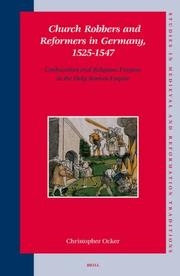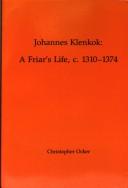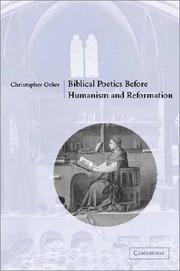| Listing 1 - 10 of 21 | << page >> |
Sort by
|

ISBN: 9004152067 9789004152069 9786611399603 1281399604 9047409981 9789047409984 9781281399601 6611399607 Year: 2006 Volume: 114 Publisher: Leiden ; Boston : Brill,
Abstract | Keywords | Export | Availability | Bookmark
 Loading...
Loading...Choose an application
- Reference Manager
- EndNote
- RefWorks (Direct export to RefWorks)
This is a study of the religious controversy that broke out with Martin Luther, from the vantage of church property. The controversy eventually produced a Holy Roman Empire of two churches. This is not an economic history. Rather, the book shows how acceptance of confiscation was won, and how theological advice was essential to the success of what is sometimes called a crucial if early stage of confessional state-building. It reviews the character of sacred property in the late Middle Ages, surveys confiscations in Reformation Germany on illustrative examples, summarizes the League of Schmalkalden's defense of confiscations, systematically studies theological memoranda that shaped a common policy in the League, and shows the role of that common position in religious politics.
Christian church history --- anno 1500-1599 --- Germany --- Biens ecclésiastiques --- Church property --- Hervorming (Luther, e.a.) --- Kerkelijk eigendom --- Kerkelijke goederen --- Propriété ecclésiastique --- Reformatie --- Reformation --- Réforme (Luther e.a.) --- Reformation. --- Church property. --- 284.1 <43> "15" --- Property, Church --- Church polity --- Property --- Protestant Reformation --- Church history --- Counter-Reformation --- Protestantism --- Lutheraanse hervorming. Reformatie van Luther--Duitsland --"15" --- History --- Luther, Martin --- Luther, Martin, --- Holy Roman Empire --- 16th century --- Heiliges Römisches Reich Deutscher Nation --- Heiliges Römisches Reich --- Svi︠a︡shchennai︠a︡ Rimskai︠a︡ Imperii︠a︡ --- Imperium Romano Germanicum --- S.R.I. --- Sacrum Romanum Imperium --- Austria

ISBN: 0871698358 9780871698353 Year: 1993 Volume: 83/5 Publisher: Philadelphia (Pa.): American philosophical society,
Abstract | Keywords | Export | Availability | Bookmark
 Loading...
Loading...Choose an application
- Reference Manager
- EndNote
- RefWorks (Direct export to RefWorks)
Augustinians --- Biography. --- -#GOSA:XX.III.D.Joa-K.M --- Biography --- #GOSA:XX.III.D.Joa-K.M --- Klenkok, Johannes, --- Ordo Eremitarum S. Augustini --- Eremitani --- Scalzi di S. Agostino --- Augustinereremitenorden --- Hermits of St. Augustine --- Religiosos Ermitaños de San Agustín --- Augustiniáni --- Ordo Eremitarum Sancti Augustini --- Scalzi di Sant'Agostino --- Hermits of Saint Augustine --- Agustinos --- Order of Saint Augustine --- Augustinian Order --- Zakon Augustjański --- OSA --- Augustinian Friars --- Austin Friars --- Order of Hermits of St. Augustine --- Order of Hermits of Saint Augustine --- Orden de San Agustín --- Agostiniani scalzi --- OESA --- O.E.S.A. --- Ordo Heremitarum S. Augustini --- Ordem dos Eremitas de Santo Agostinho --- Augustinians - Germany - Biography. --- Klenkok (johannes) --- Biographie
Multi
ISBN: 9781107197688 9781108178624 9781316647844 Year: 2018 Publisher: Cambridge : Cambridge University Press,
Abstract | Keywords | Export | Availability | Bookmark
 Loading...
Loading...Choose an application
- Reference Manager
- EndNote
- RefWorks (Direct export to RefWorks)
Martin Luther - monk, priest, intellectual, or revolutionary - has been a controversial figure since the sixteenth century. Most studies of Luther stress his personality, his ideas, and his ambitions as a church reformer. In this book, Christopher Ocker brings a new perspective to this topic, arguing that the different ways people thought about Luther mattered far more than who he really was. Providing an accessible, highly contextual, and non-partisan introduction, Ocker says that religious conflict itself served as the engine of religious change. He shows that the Luther affair had a complex political anatomy which extended far beyond the borders of Germany, making the debate an international one from the very start. His study links the Reformation to pluralism within western religion and to the coexistence of religions and secularism in today's world.
2 LUTHER, MARTIN --- 284.1 --- 284.1 Lutheraanse hervorming. Reformatie van Luther --- Lutheraanse hervorming. Reformatie van Luther --- 2 LUTHER, MARTIN Godsdienst. Theologie--LUTHER, MARTIN --- Godsdienst. Theologie--LUTHER, MARTIN --- Luther, Martin, --- Luther, Maarten --- Lutherus, Martinus --- Lutero, Martin --- Luther, Martin --- Christian church history --- Reformation. --- Church history. --- Europe --- History. --- Réforme protestante --- Christianisme --- Histoire religieuse --- Luter, Martinos, --- Lutr, Martin, --- Лютер, Мартін, --- Li︠u︡ter, Martin, --- Luter, Marcin, --- Luther, Maarten, --- Lutero, Martín, --- Luther, Martinus, --- Luther, Márton, --- Luther, Martti, --- Luther, Martí, --- Lutʻŏ, --- Lūtœ̄, Mātīn, --- D. M. L. A., --- Luters, Mārtiņš, --- Luter, Marṭin, --- Luther, Marczin, --- Rutā, Marutin, --- Joerg, Junker, --- לוטהער, מארטין --- לוטהער, מארטין, --- לותר --- 路德马丁, --- Luttar Cāstiriyār, --- Cāstiriyār, Luttar, --- ルター マルティン, --- Лютэр, Марцін, --- Li︠u︡tėr, Martsin, --- Лутер, Мартин, --- Liuteris, Martynas, --- Lutawm, Matees, --- Lu-toe, Ma-ti, --- Lotera, Martin, --- Lusā, Mātaṅʻ, --- Lūthœ̄, Mātin, --- Luta, Martin, --- Lute̳e̳r, Martẽ, --- Lūthar, Mārṭin, --- Réforme protestante
Book
ISBN: 110818720X 1108178626 110819561X 1107197686 1316647846 Year: 2018 Publisher: Cambridge : Cambridge University Press,
Abstract | Keywords | Export | Availability | Bookmark
 Loading...
Loading...Choose an application
- Reference Manager
- EndNote
- RefWorks (Direct export to RefWorks)
Martin Luther - monk, priest, intellectual, or revolutionary - has been a controversial figure since the sixteenth century. Most studies of Luther stress his personality, his ideas, and his ambitions as a church reformer. In this book, Christopher Ocker brings a new perspective to this topic, arguing that the different ways people thought about Luther mattered far more than who he really was. Providing an accessible, highly contextual, and non-partisan introduction, Ocker says that religious conflict itself served as the engine of religious change. He shows that the Luther affair had a complex political anatomy which extended far beyond the borders of Germany, making the debate an international one from the very start. His study links the Reformation to pluralism within western religion and to the coexistence of religions and secularism in today's world. Luther, Conflict, and Christendom includes a detailed chronological chart.
Luther, Martin, --- Luther, Maarten --- Lutherus, Martinus --- Lutero, Martin --- Luther, Martin --- Luter, Martinos, --- Lutr, Martin, --- Лютер, Мартін, --- Li︠u︡ter, Martin, --- Luter, Marcin, --- Luther, Maarten, --- Lutero, Martín, --- Luther, Martinus, --- Luther, Márton, --- Luther, Martti, --- Luther, Martí, --- Lutʻŏ, --- Lūtœ̄, Mātīn, --- D. M. L. A., --- Luters, Mārtiņš, --- Luter, Marṭin, --- Luther, Marczin, --- Rutā, Marutin, --- Joerg, Junker, --- לוטהער, מארטין --- לוטהער, מארטין, --- לותר --- 路德马丁, --- Luttar Cāstiriyār, --- Cāstiriyār, Luttar, --- ルター マルティン, --- Лютэр, Марцін, --- Li︠u︡tėr, Martsin, --- Лутер, Мартин, --- Liuteris, Martynas, --- Lutawm, Matees, --- Lu-toe, Ma-ti, --- Lotera, Martin, --- Lusā, Mātaṅʻ, --- Lūthœ̄, Mātin, --- Luta, Martin, --- Lute̳e̳r, Martẽ, --- Lūthar, Mārṭin,
Book
ISBN: 1108477976 1108775438 1108808379 1108806805 9781108775434 9781108477970 9781108745338 Year: 2022 Publisher: Cambridge : Cambridge University Press,
Abstract | Keywords | Export | Availability | Bookmark
 Loading...
Loading...Choose an application
- Reference Manager
- EndNote
- RefWorks (Direct export to RefWorks)
Three basic forces dominated sixteenth-century religious life. Two polarized groups, Protestant and Catholic reformers, were shaped by theological debates, over the nature of the church, salvation, prayer, and other issues. These debates articulated critical, group-defining oppositions. Bystanders to the Catholic-Protestant competition were a third force. Their reactions to reformers were violent, opportunistic, hesitant, ambiguous, or serendipitous, much the way social historians have described common people in the Reformation for the last fifty years. But in an ecology of three forces, hesitations and compromises were natural, not just among ordinary people, but also, if more subtly, among reformers and theologians. In this volume, Christopher Ocker offers a constructive and nuanced alternative to the received understanding of the Reformation. Combining the methods of intellectual, cultural, and social history, his book demonstrates how the Reformation became a hybrid movement produced by a binary of Catholic and Protestant self-definitions, by bystanders to religious debate, and by the hesitations and compromises made by all three groups during the religious controversy.
Religious disputations. --- Reformation. --- Europe --- Religion --- Colloquies, Religious --- Disputations, Religious --- Disputations, Theological --- Religious colloquies --- Religious debates --- Theological disputations --- Theology --- Debates and debating --- Protestant Reformation --- Reformation --- Church history --- Counter-Reformation --- Protestantism --- Disputations --- History --- Religious disputations --- Protestants Europe --- Catholics Europe --- Intellectual life --- Council of Europe countries --- Eastern Hemisphere --- Eurasia
Book
Year: 1991 Publisher: Boston Cambridge university press
Abstract | Keywords | Export | Availability | Bookmark
 Loading...
Loading...Choose an application
- Reference Manager
- EndNote
- RefWorks (Direct export to RefWorks)

ISBN: 0521810469 Year: 2002 Publisher: Cambridge Cambridge University press
Abstract | Keywords | Export | Availability | Bookmark
 Loading...
Loading...Choose an application
- Reference Manager
- EndNote
- RefWorks (Direct export to RefWorks)
Digital
ISBN: 9781108775434 Year: 2022 Publisher: Cambridge Cambridge University Press
Abstract | Keywords | Export | Availability | Bookmark
 Loading...
Loading...Choose an application
- Reference Manager
- EndNote
- RefWorks (Direct export to RefWorks)
Book
ISBN: 3030320189 3030320170 Year: 2020 Publisher: Cham : Springer International Publishing : Imprint: Springer,
Abstract | Keywords | Export | Availability | Bookmark
 Loading...
Loading...Choose an application
- Reference Manager
- EndNote
- RefWorks (Direct export to RefWorks)
This collection of essays offers a series of rigorously focused art-historical, historical, and philosophical studies that examine ways in which materiality has posed and still poses a religious and cultural problem. The volume examines the material agency of objects, artifacts, and environments: art, ritual, pilgrimage, food, and philosophy. It studies the variable "senses” of materiality, the place of materiality in the formation of modern Western religion, and its role in Christianity’s dialogue with non-Western religions. The essays present new interpretations of religious rites and outlooks through the focus on their material components. They also suggest how material engagement theory - a new movement in cultural anthropology and archeology - may shed light on the cultural history of Christianity in medieval and early modern Europe and the Americas. It thus fills an important lacuna in the study of western religion by highlighting the longue durée, from the Middles Ages to the Modern Period, of a current dilemma, namely the divide between materialistic and what might broadly be called hermeneutical or cultural-critical approaches to religion and human subjectivity.
Human body --- Religious aspects --- Christianity. --- Religion—Philosophy. --- Europe—History. --- America—History. --- Philosophy of Religion. --- European History. --- History of the Americas. --- Christianity --- Religions --- Church history --- Religion --- Philosophy. --- Europe --- America --- History. --- Gay culture Europe
Digital
ISBN: 9783030320171 9783030320188 Year: 2020 Publisher: Cham Springer
Abstract | Keywords | Export | Availability | Bookmark
 Loading...
Loading...Choose an application
- Reference Manager
- EndNote
- RefWorks (Direct export to RefWorks)
Religious studies --- Comparative religion --- Ethnology. Cultural anthropology --- Europe --- United States of America
| Listing 1 - 10 of 21 | << page >> |
Sort by
|

 Search
Search Feedback
Feedback About UniCat
About UniCat  Help
Help News
News